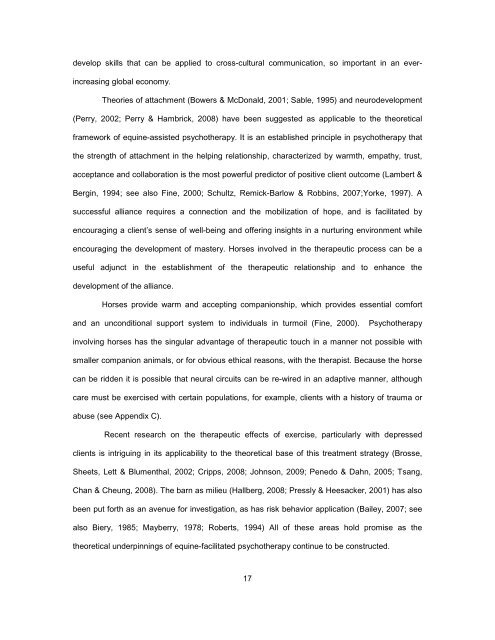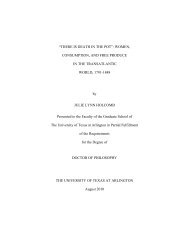A SYSTEMATIC REVIEW OF THE EFFECTS OF PSYCHOTHERAPY ...
A SYSTEMATIC REVIEW OF THE EFFECTS OF PSYCHOTHERAPY ...
A SYSTEMATIC REVIEW OF THE EFFECTS OF PSYCHOTHERAPY ...
You also want an ePaper? Increase the reach of your titles
YUMPU automatically turns print PDFs into web optimized ePapers that Google loves.
develop skills that can be applied to cross-cultural communication, so important in an everincreasing<br />
global economy.<br />
Theories of attachment (Bowers & McDonald, 2001; Sable, 1995) and neurodevelopment<br />
(Perry, 2002; Perry & Hambrick, 2008) have been suggested as applicable to the theoretical<br />
framework of equine-assisted psychotherapy. It is an established principle in psychotherapy that<br />
the strength of attachment in the helping relationship, characterized by warmth, empathy, trust,<br />
acceptance and collaboration is the most powerful predictor of positive client outcome (Lambert &<br />
Bergin, 1994; see also Fine, 2000; Schultz, Remick-Barlow & Robbins, 2007;Yorke, 1997). A<br />
successful alliance requires a connection and the mobilization of hope, and is facilitated by<br />
encouraging a client’s sense of well-being and offering insights in a nurturing environment while<br />
encouraging the development of mastery. Horses involved in the therapeutic process can be a<br />
useful adjunct in the establishment of the therapeutic relationship and to enhance the<br />
development of the alliance.<br />
Horses provide warm and accepting companionship, which provides essential comfort<br />
and an unconditional support system to individuals in turmoil (Fine, 2000).<br />
Psychotherapy<br />
involving horses has the singular advantage of therapeutic touch in a manner not possible with<br />
smaller companion animals, or for obvious ethical reasons, with the therapist. Because the horse<br />
can be ridden it is possible that neural circuits can be re-wired in an adaptive manner, although<br />
care must be exercised with certain populations, for example, clients with a history of trauma or<br />
abuse (see Appendix C).<br />
Recent research on the therapeutic effects of exercise, particularly with depressed<br />
clients is intriguing in its applicability to the theoretical base of this treatment strategy (Brosse,<br />
Sheets, Lett & Blumenthal, 2002; Cripps, 2008; Johnson, 2009; Penedo & Dahn, 2005; Tsang,<br />
Chan & Cheung, 2008). The barn as milieu (Hallberg, 2008; Pressly & Heesacker, 2001) has also<br />
been put forth as an avenue for investigation, as has risk behavior application (Bailey, 2007; see<br />
also Biery, 1985; Mayberry, 1978; Roberts, 1994) All of these areas hold promise as the<br />
theoretical underpinnings of equine-facilitated psychotherapy continue to be constructed.<br />
17
















